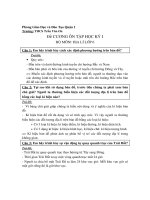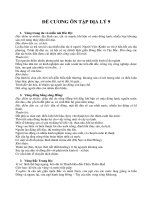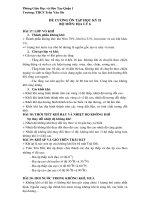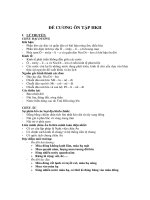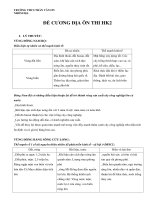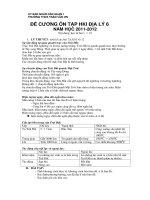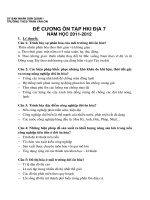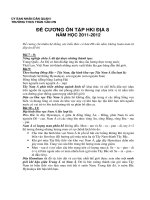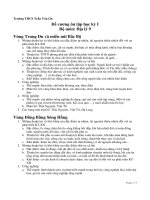Tiếng Anh 9 :: Trường THCS Trần Văn Ơn :: | Tin tức | Dạy và Học | Anh | Hướng dẫn ôn tập môn tiếng Anh HK1 nh 20122013 DC AV 9 HKI 12 13
Bạn đang xem bản rút gọn của tài liệu. Xem và tải ngay bản đầy đủ của tài liệu tại đây (23.85 KB, 4 trang )
ÔN TẬP NGỮ PHÁP HỌC KỲ 1 LỚP 9
A. USED TO
S + used to + bare infinitive
B. Be
Noun
+ used to +
Get
= quen v ới
V+ing
= Be
Noun
+ accustomed +
Get
V+ing
to + infinitive
C. S + be + used +
= được dùng để
for + V+ing
D. Structures with It’s time/ I’d rather/ Had better
1. It’s time + S + past subjunctive
EX: It’s time you studied your lessons.
2. I’d rather + S + past subjunctive
EX: I’d rather you cooked dinner.
3. Had better + bare infinitive
EX: I’d better go home now.
E. Passive voice
1. Modal passive: S+ modal verb + be + p.p
EX: Our house will be repainted by my mother.
2. Present simple passive: S + am/is/are + p.p
EX: A lot of rice is grown in Asia.
3. Simple past passive: S + was/were + p.p
EX: When the headmaster was away, his work was done by his assistant.
4. Present continuous passive: S + am/is/are + being + p.p
EX: I can’t use my car today. It is being serviced in the garage.
5. Past continuous passive: S + was/were + being + p.p
EX: When we came, a new market was being built in the town center.
6. Present perfect passive: S + has/have + been + p.p
EX: The car can work now. It has just been repaired.
7. Questions:
EX: Who wrote that play? By whom was that play written?
8. Material agent:
EX: Smoke filled the room. The room was filled with smoke.
9. Negative pronoun agent
EX: Nobody can unlock the case. The case can’t be unlocked.
10. Sentences with 2 objects
EX: Mary’s parents gave her a birthday present.
Mary was given a birthday present by her parents.
A birthday present was given to Mary by her parents.
11. Sentences with People think, consider,…
EX: People think that he is living abroad.
It is thought that he is living abroad.
He is thought to be living abroad.
F. Sentence structures with Wish and If only
1. For present actions
S1 + wish + S2
V + ed
+ unreal past +
V2
Be were
If only + S
Can could
EX: I can’t speak Chinese.
I wish
I could speak Chinese.
If only
2. For future actions
S1 + wish + S2
+
would/could
If only + S
+
were going to
+ infinitive
EX: We are going to do a test tomorrow.
We wish we
weren’t going to do a test tomorrow.
If only we
G. Adverb clauses of Result
1. Main clause + so + Result clause
EX: Our suitcases were very heavy, so we took a taxi.
2. S + V + so + Adjective + Adverb + that + S +V
EX: He was so ill that we had to send for a doctor.
3. S + V + so + many + count noun
much + noncount noun
+ that + S + V
EX: She put so much sugar in the coffee that she couldn’t drink it.
4. S + V + so + few + count noun
+ that + S + V
little + noncount noun
EX: There were so few students that the class had to be cancelled.
5. S + V +such + (a/an/ a lot of) + Adj + Noun + that + S + V
EX: I saw such a funny car toon that I couldn’t help laughing.
H. Prepositions of Time
In: in the morning, in the afternoon, in the evening
in March, in 1999, in the winter, in the 20 th century
in an hour, in a minute, in a week, in a moment
in the beginning, in the end, in a day
On: on August 8 th, on Tuesday, on weekdays, on Christmas day
on Monday morning, on a fine sunny day
At: at 9 o’clock, at midnight, at noon, at dawn, at luchtime
at Christmas, at Easter, at Ramadan, at the beginning
at the end, at last, at the moment, at present, at times
I. Modal verbs with conditional sentences (Type 1)
Form:
If clause
+
Main clause
Present tense
will / can
Simple present
may / m ight
EX: If Tom studies harder, he will pass the exam.
If father is sleeping, you can go out.
J. Reported speech
1. Statements
Form:
said that
S + said to
+ Obj + that + S + V + O
told
(changed)
Direct: He said, “I’ll lend you my book, Alice”.
Reported: He told Alice that he would lend her his book.
2. Wh-questions:
Form: S + asked + Obj + wh-word + S + V + O
wanted to know
(changed)
Direct: She said, “Where are you going now, Tom?”
Reported: She asked Tom where he was going then.
+ infinitive
3. Yes-No questions:
Form: S + asked + Obj +if/whether + S + V + O
wanted to know
(changed)
Direct: She said, “Do you go to school today, my son?”
Reported: She asked her son if he went to school that day.
4. Imperatives
asked
Form:
told
S+
ordered
+ Obj + To -infinitive
forced
Not + to - infinitive
advised
begged
Direct: He said, “Open the windows, please”.
Reported: She told me to open the windows.
Direct: He said, “ Don’t be late for school, Alice”.
Reported: He advised Alice not to be late for school.
K. Tag questions
1. General rule:
Affirmative statement, negative tag -question.
Negative statement, affirmative tag -question.
EX: Your brother likes watchi ng foreign films, doesn’t he?
Mary has never been late for class, has she?
2. Some exceptions
a) Let’s go to the cinema, shall we?
b) Open the windows, will you?
c) Somebody came here yesterday, didn’t they?
d) Everything will be all right, won’t it?
e) I am always on time for class, aren’t I?
